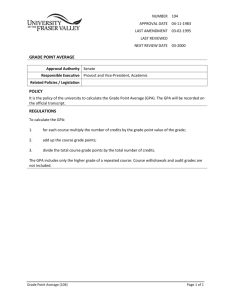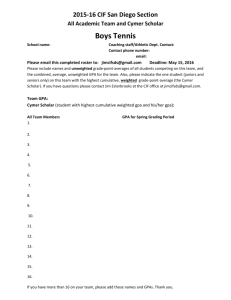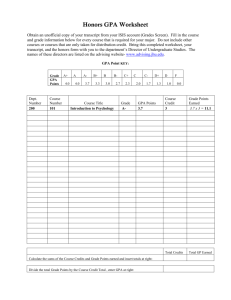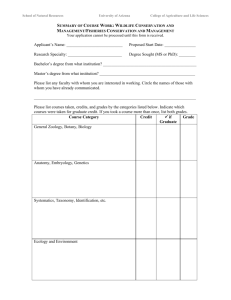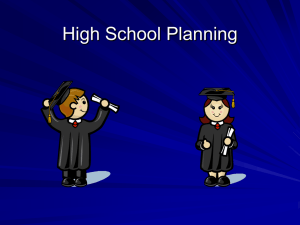Begin with the End in Mind 10/10/13
advertisement
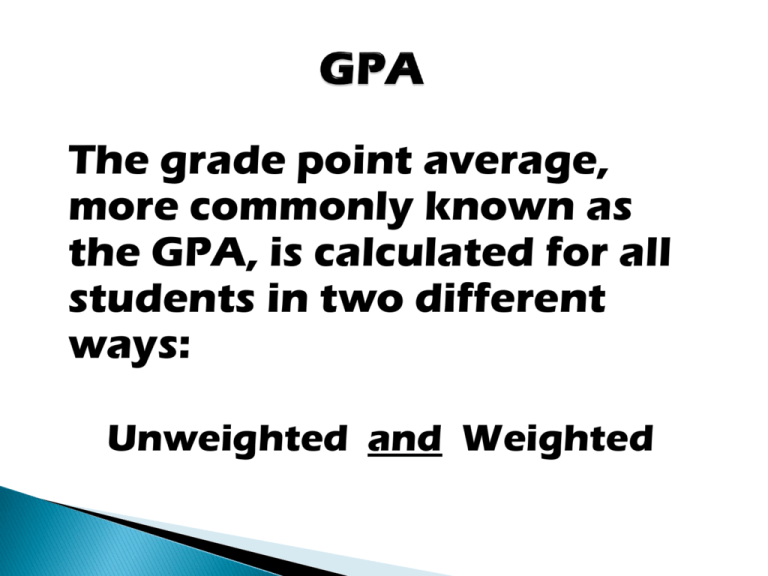
The grade point average, more commonly known as the GPA, is calculated for all students in two different ways: Unweighted and Weighted An unweighted GPA is calculated for every student beginning with the first high school course a student takes, including those taken in middle school, and is calculated on a traditional 4.0 scale. Scale 90 – 100 = 4.0 80 – 89 = 3.0 70 – 79 = 2.0 0 – 69 = 0.0 The unweigheted GPA is calculated using ALL high school courses, no matter what the subject. Weighted GPA A weighted GPA is calculated for all students based on a scale which gives a higher weight to upper level courses, and it is used for class ranking. Scale AP Courses = up to 7 points Pre-AP Courses = up to 6 points Regular courses = up to 5 points * The weighted GPA is calculated using only courses in the following subject areas: English, Math, Science, Social Studies (including Economics), and Foreign language. ANY course which falls under these subject areas, (ex. Communication Applications, Psychology, Debate, yearbook, etc.) and grades earned in these courses during middle school, WILL also be included in the weighted GPA, and therefore will affect the class rank. Importance of GPA It is a quick indicator to colleges of your academic stamina. It is one of the main criteria looked at on college applications. It is a snapshot encompassing your time in high school in one element. It is a quick indicator to employers and military of your potential as a member of their organization. A student should select the most rigorous courses he/she is capable of completing. Colleges will look for rigor. (However, beware of overloading your student in the 9th grade year) Aids in college admission at selective institutions AP classes can help you earn college credits through AP Exams (AP Exam taken at end of year. Score must be at a certain level, which is determined by each individual institution, to receive credit) Weighted at the highest level, which can help increase class rank Dual Credit What are the Benefits? Introduction to college courses while in the high school setting Helps get a head start on college credits (College credit guaranteed at all Texas public colleges by earning a “B” (80 or better) in the course) Earn high school and college credit at the same time Weighted at the PreAP level, which can help increase class rank What is Success? Self Management Skills Self awareness Emotion management Self-confidence Stress management Resilience Skills to forgive and forget Persistence and Perseverance Patience People Skills Communication skills Presentation skills Influence / persuasion skills Team work skills Leadership skills Skills in dealing with difficult personalities and difficult situations Ability to think / communicate on your feet (under pressure Interpersonal relationship skills Organizing skills High School Success Regular attendance Take advantage of extra opportunities Attentive in class Talk directly to their teachers about grades and work with them during tutorials Turn in all assignments Take pride in work High School Success Participating in fine arts and athletics Taking challenging classes Finding a great group of friends Working with a clear set of goals for college, career, and beyond Participating in extracurricular activities Community service and extracurricular activities play an important role with colleges and scholarship committees. Become involved in school and community activities now – don’t wait until your senior year Seek activities and opportunities relative to your future career plans Visit the Northwest High School Counseling website for volunteer and community service activities Start an activities record including all school and community activities, leadership positions, honors, awards, uniques educational experiences, employment, and volunteer work. THE BIG EVENT! April 5, 2014 ◦ Be sure to update this record at least once a year. • Study: grades are reported on your permanent transcript • Select challenges classes • Explore extracurricular interests and volunteer work • Start an activities record listing honors, awards, and activities • Take the PSAT • Start a college savings account • Visit college websites and campuses • Research college information - Visit the NHS Counseling website for helpful resources 1. My 9th grade year doesn’t count; I have plenty of time to make it up. 2. I chose this class because my friend is taking it. 3. I skipped 4th period because it won’t hurt to miss one day of that class. 4. I don’t feel like doing my homework, so I’ll just do well on the test. 5. I don’t have time to join school clubs because I have to spend my free time studying. 6. Everyone else understood the teacher’s explanation but me; I am too embarrassed to ask the teacher for more help. 7. I am afraid to tell the teacher about the problems I am having with this class. 8. I want to take blow off classes during my senior year. The Recommended Program: ◦ 26 Credits 4 4 4 4 2 English Math Science Social Studies World Languages (same language) Spanish, French, or German 1 Physical Education 1 Fine Art Art, Choir, Dance, Theatre Arts, and more ½ Credit of Communication Applications (Speech) 5 ½ Elective The Distinguished Program: ◦ Designed for students who want to achieve beyond the state recommended graduation requirements ◦ Criteria for the Distinguished Achievement Program Meet all requirements of the Recommended Graduation Program Requires 3 credits of a World Language Obtain a combination of 4 of the following advanced measures or through independent research project AP classes with scores of 3 or higher on the AP Exam National Merit Commendation (PSAT) College courses must earn a B or higher Tips for choosing classes 4 years to take 2-3 years of foreign language 12 elective spots—Fine Arts, PE, 1 semester of speech The courses you take now give you more room!! Being PreAP ready—look at strengths, choose 2(discuss balance with 3-4) Mapping Out the Next 4 Years Counselors from your high school will come in the spring Look at ALL 4 YEARS—make sure you have room Fun vs. balance vs. rigor
